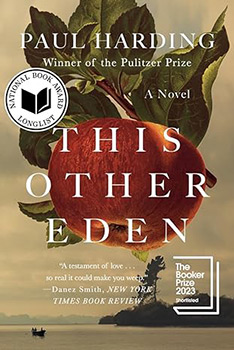Summary | Excerpt | Reading Guide | Reviews | Beyond the Book | Readalikes | Genres & Themes | Author Bio

A Novel
by Paul Harding
The water hit the south shore of the island first and swallowed it whole and smooth. Then it hit the jagged bedrock spine running up the middle of the island and broke over it hissing like a saw blade. When it struck the slope of the bluff it exploded across the horizon in front of the islanders in the tree, hung up and suspended for a moment in an apocalyptic entablature, that Patience afterward always said looked in that instant before it all collapsed back together and swept along how the parted sea must have appeared to the poor Israelites. I was pretty well given up on it all and in that tree holding it so hard the bark cut into my arms and gave me these scars and holding that baby so hard against me I thought I'd crack it, drenched to the marrow and screaming and trying not to let go, but when that tower of ocean and ruination burst apart in front of me, in a blink, but deep as my soul, I saw a broad, dry avenue running through the middle of the sea, and it was thronged with shepherds and sheep and old ladies on donkeys, litters of children curled up asleep on hay in the beds of rickety carts. The parted ocean towered on both sides, sheer, smooth, and monolithic. And inside the water, a pell-mell cavalcade of Egyptian men and horses and chariots scrolled past, tumbling heel over headdress, fetlock over cannon, bumper over shaft. Most of the men wore linen tunics, but some wore leopard skins and feathers and had elaborate headdresses. Some of them were tethered to their chariots by leather reins and held longbows. Arrows and spears twirled among the men and horses and cars. Their black-lined eyes stared wide open, but they were all clearly drowned. And I knew what it was like when God parted the sea. And I knew that Moses was way up there at the front of the line. Not like the idea of Moses, but the man himself. The very man, Moses. When God opened the ocean. Then the waters collected all the relic and rubble back up and swept over the rest of the island. The water churned and rose and rose up the Penobscot pine laden with the Honeys.
Patience looked down through the branches and limbs and watched the seething waters rise over her children's and grandchildren's feet, billow up their skirts and rise over their midriffs and up their exposed throats then into their sputtering mouths, and she watched their hair soak up the boiling waters, and she watched the waters swill Benjamin up, too, and she watched her daughter, Charity Honey, wrench free from the tree and tumble away in the wreckage clutching her baby son, David, in her arms, and the waters reached her feet and she felt something deep down in the bottom of the tree crack and give and the tree bowed and she was in the swift and roaring waters up to her waist. Then the tree levered itself back upright. Though it seemed not to swallow at her quite as greedily as it first had, the water still rose, and it reached Patience's collarbone and Patience always said she could still just see the top of Benjamin's head below her in the water, serene, almost, almost becalmed, tiny bubbles of air rising from his hair. And it was then, just as the water touched it at her throat, that Patience remembered the old flag she'd sewn for Benjamin from the bits and pieces of other flags and national rags and bedraggled patches, not long after they'd married and first settled their now drowning island, still tied around her neck. She always said later, I just decided right then that if we were all going to Judgment, I was going to fly our little flag until the last possible second. So, I hoisted that baby up even more and pressed it between the tree and my breast harder than I ever otherwise would have dared and freed my hand and somehow unknotted the flag from my neck and held it in my hand and held my hand up just as high as I could get it, and the wind took the flag up and snapped it and practically tore it from of my grasp but I kept hold and there it flew. Then the water rose over the baby, who'd gone past wailing and just stared, wedged between my body and the tree, dumbfounded at the pandemonium, wide-eyed and quiet as it burbled under, and the water reached my mouth and covered my face and went over my head, and still I held that foolish flag as high as I could, and the water rose up my shoulder, and the water rose up to my raised elbow, and the water rose up my forearm, and the water reached my wrist, and so there was just my one hand holding that motley little tattered flag sticking up above the surface of the flood, and the waters rose up my fingers, and just as my hand was about to disappear and that flag and all us Honeys be swallowed up in the catastrophe, the water stopped rising.
Excerpted from This Other Eden by Paul Harding. Copyright © 2023 by Paul Harding. Excerpted by permission of W.W. Norton & Company. All rights reserved. No part of this excerpt may be reproduced or reprinted without permission in writing from the publisher.
Your guide toexceptional books
BookBrowse seeks out and recommends the best in contemporary fiction and nonfiction—books that not only engage and entertain but also deepen our understanding of ourselves and the world around us.